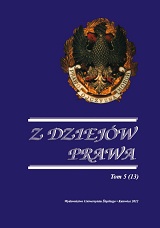Koncepcje ustrojowe niemieckich partii liberalnych w latach 1945—1948
System conceptions of liberal parties between 1945 and 1948
Author(s): Michał BożekSubject(s): Law, Constitution, Jurisprudence
Published by: Wydawnictwo Uniwersytetu Śląskiego
Summary/Abstract: The beginnings of the liberal movement as a political party in post-war Germany were not easy. The first liberal party organizations were created on the level of each occupation zones as separate political structures. The process of consolidation of these organizations took place gradually. Firstly, it covered the integration of organizations concentrated within each of the zone. The second stage of the very process of consolidation of the German liberal movement was to consist in the unification of the most important party centres from particular occupation zones, and creation of a unified political party. However, the development of the international situation led to the split between liberal activists from the Soviet zone and politicians of liberal parties from western occupation zones in 1948. From that time, the consolidation process of a liberal formation concerned only party organizations from western occupation zones. Its closure was the unity of these organizations and creation of a liberal political party on their basis, which happened in December 1948. The very party was officially called FDP — a Liberal-Democratic Party, under the label of which acted liberal politicians in the British zone. An organizational split of the liberal movement caused a situation in which it did not constitute a whole in terms of the programme either. Before they united particular liberal organizations within the FDP, the very movement encompassed various trends and programme tendencies. It also concerned the systemic issues of post-war Germany. The only document liberal politicians managed to prepare was Wytyczne polityczno-ustrojowe presented during a constitutional debate in Zone Advisory Council in 1947. The very conception, however, was not representative for the whole liberal movement. Apart from general slogans on the need to build a democratic, legal and federal nation, liberal politicians did not manage to work out a coherent and unified system conception of post-war Germany between 1945 and 1948.
Journal: Z Dziejów Prawa
- Issue Year: 13/2012
- Issue No: 5
- Page Range: 233-251
- Page Count: 19
- Language: Polish

